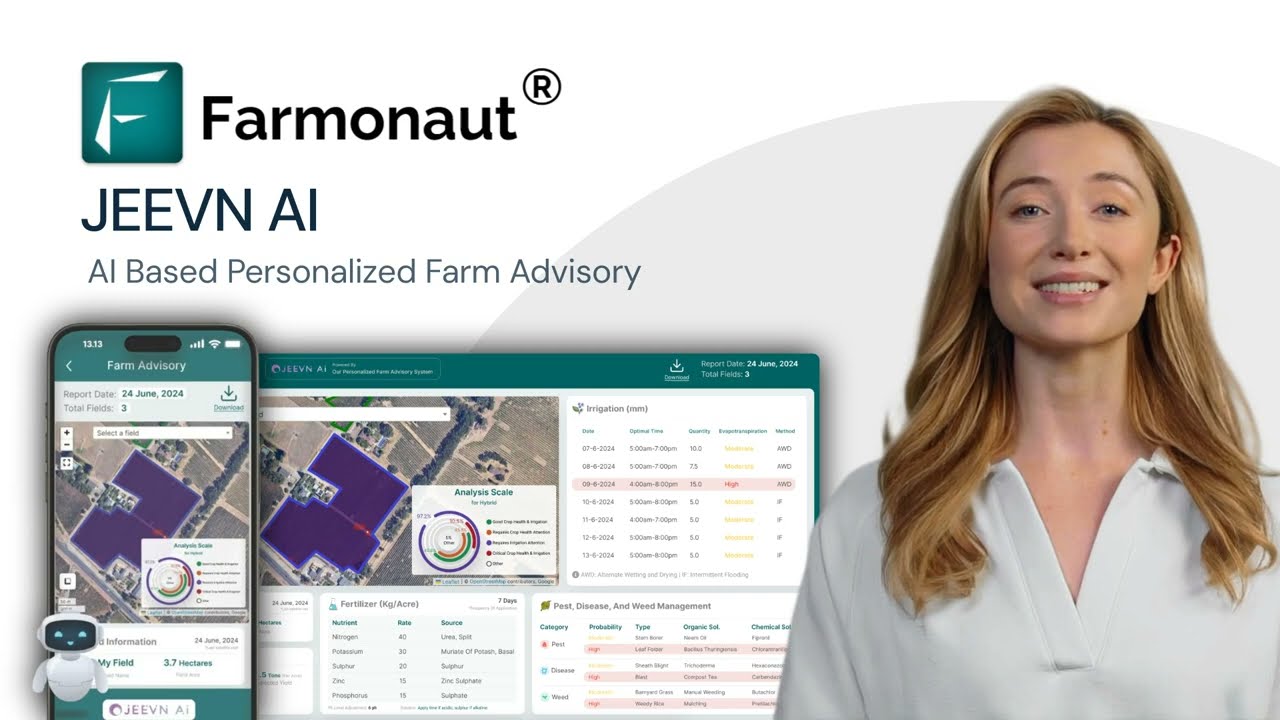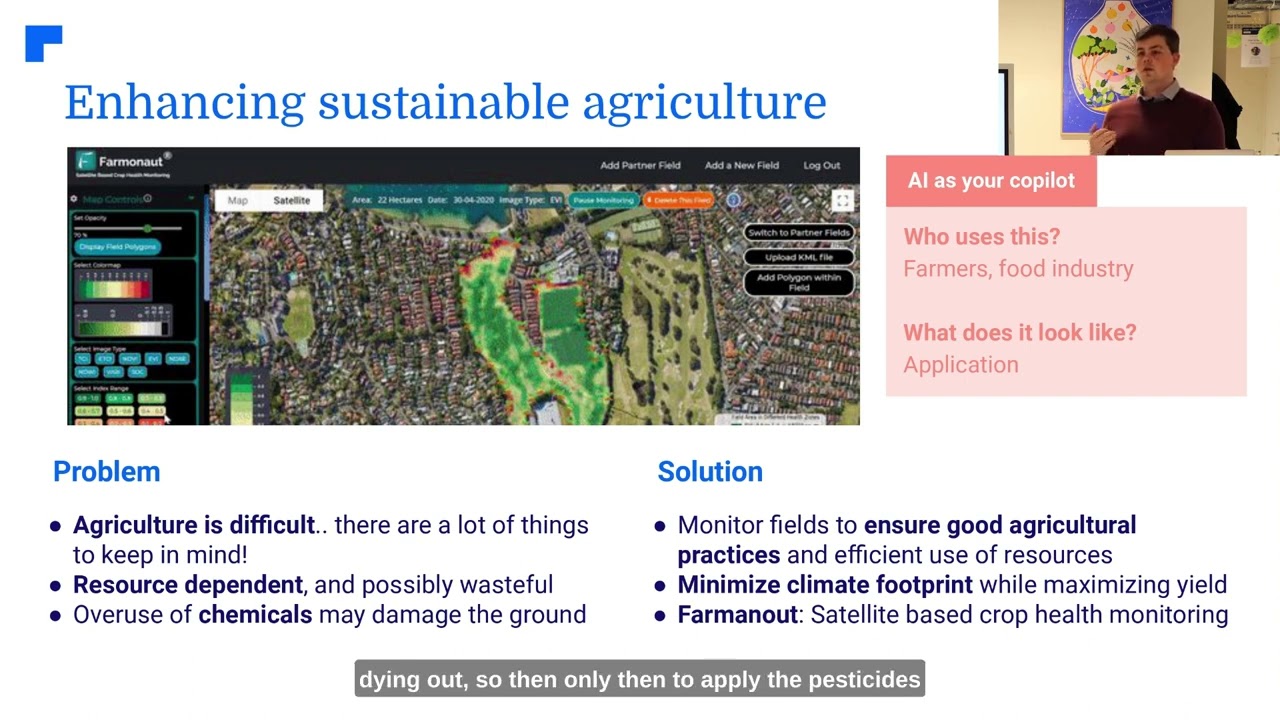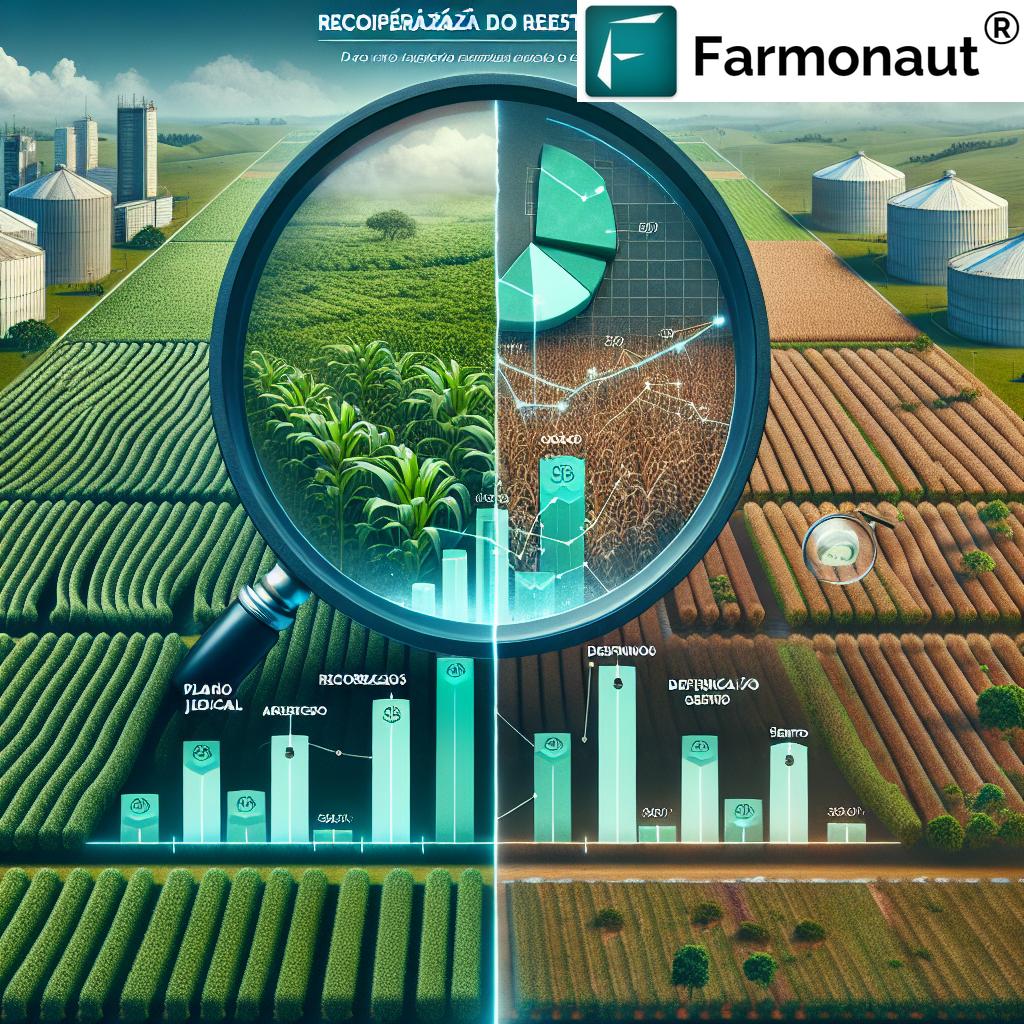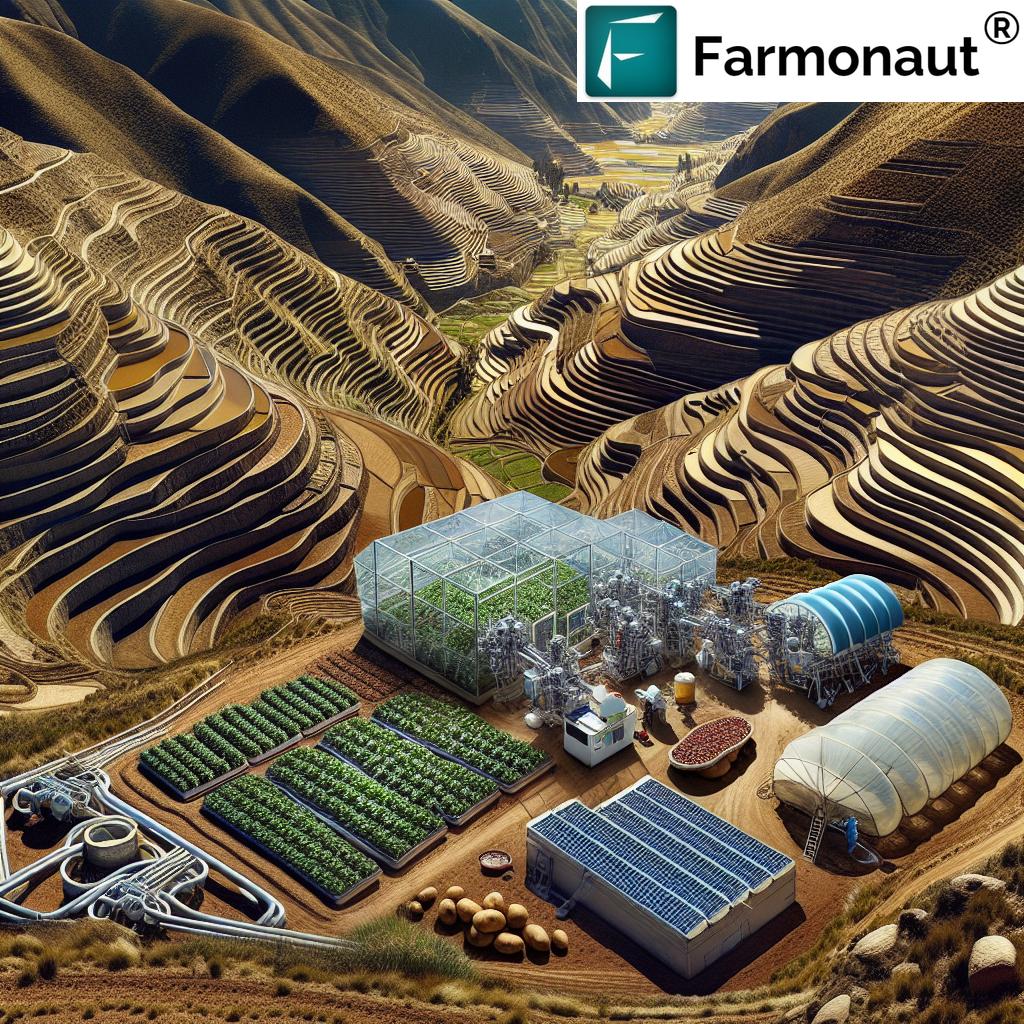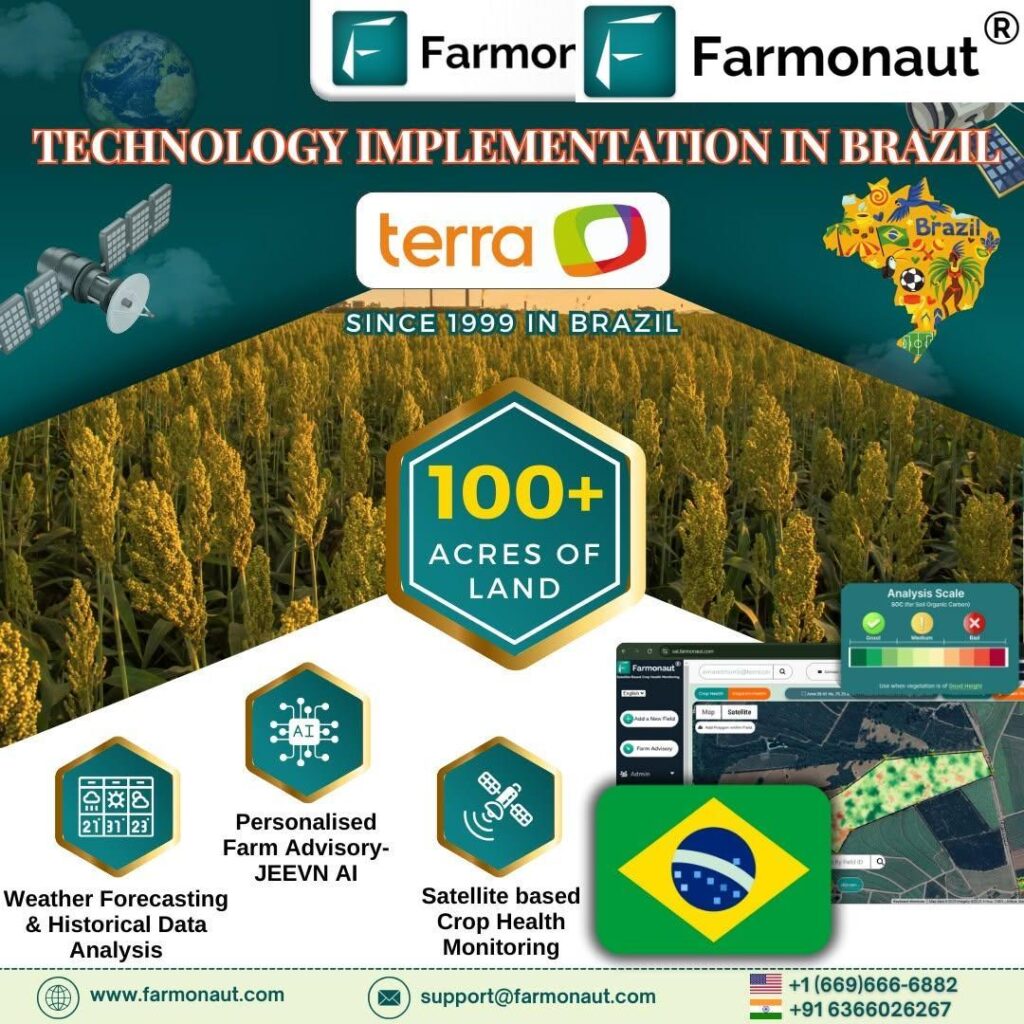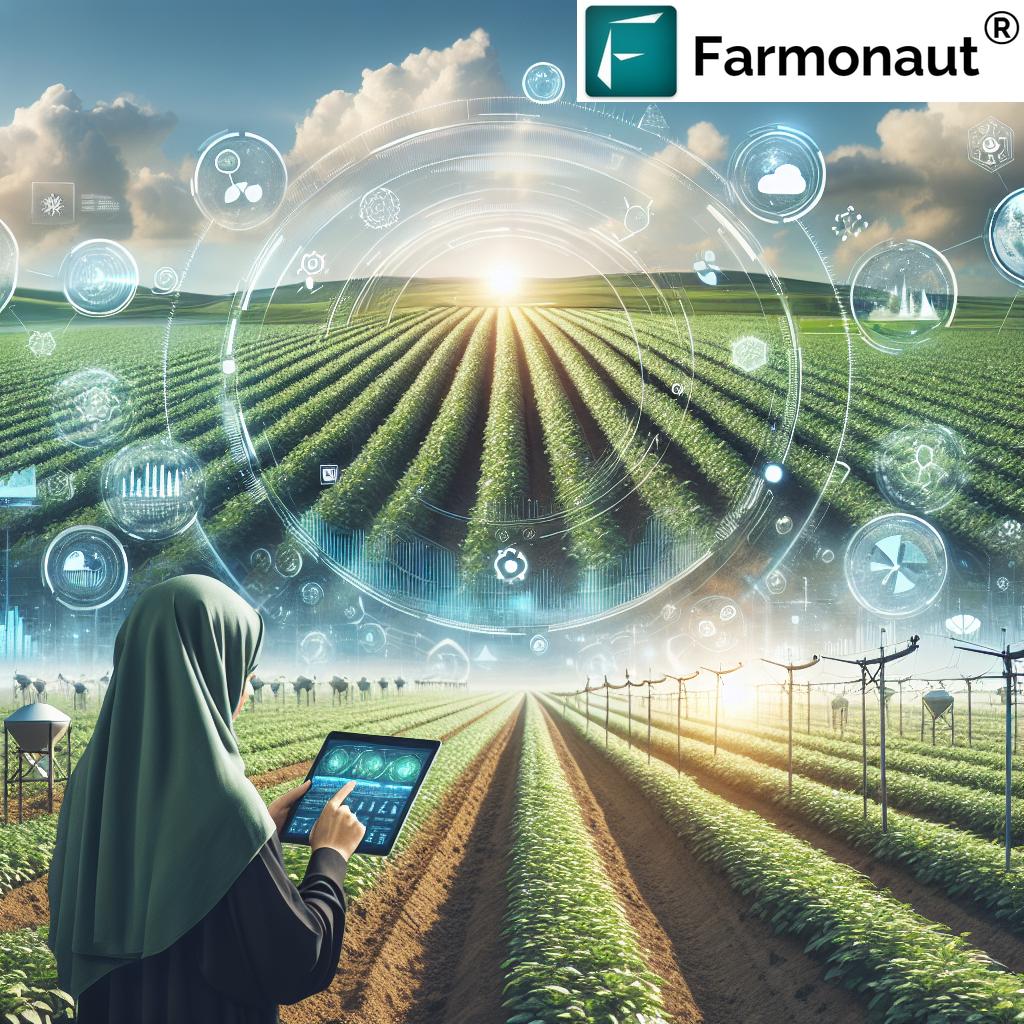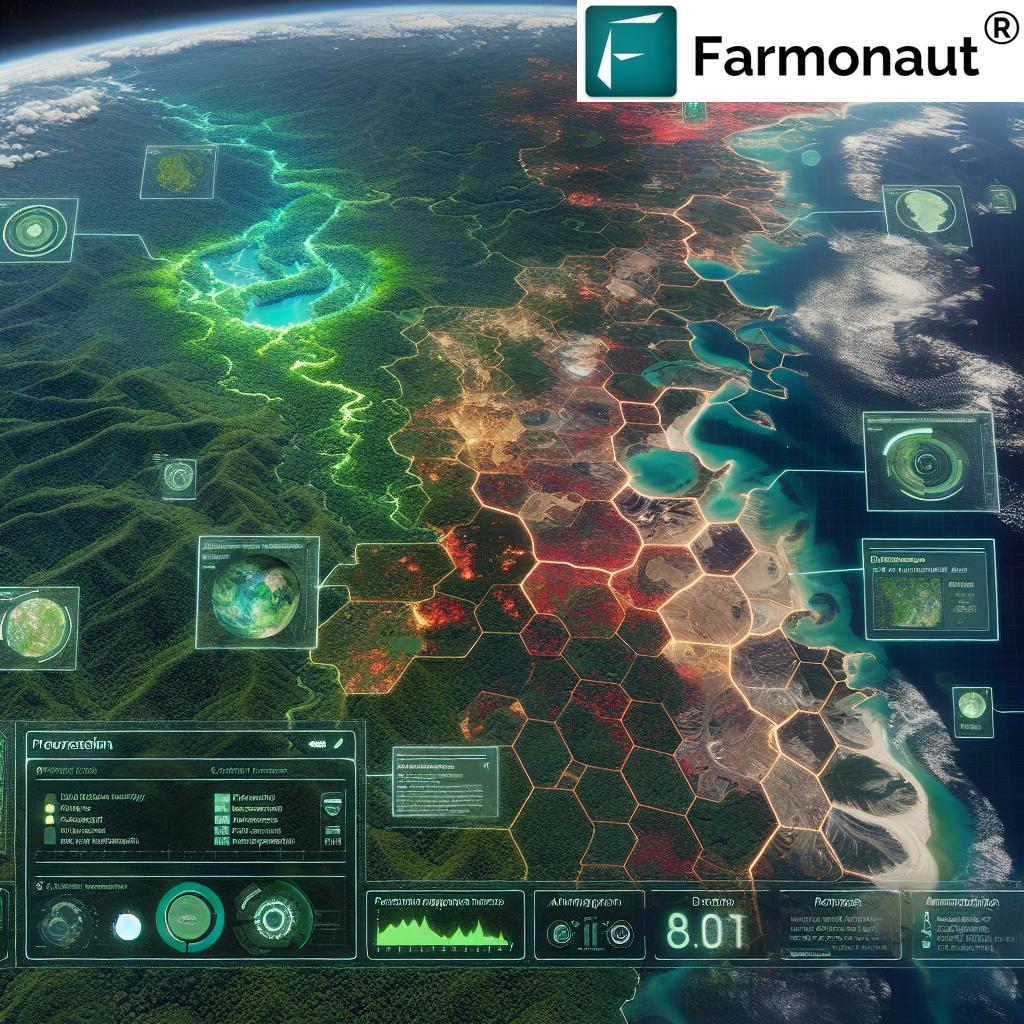Revolutionizing Sugarcane Farming: How Farmonaut’s Tech Innovations Boost Yields and Sustainability in Latin America

“Farmonaut’s satellite-based crop monitoring can analyze up to 10,000 acres of sugarcane fields in a single day.”
In the ever-evolving landscape of agriculture, we’re witnessing a remarkable transformation in sugarcane farming across Latin America. As we delve into this revolution, we’ll explore how cutting-edge technologies are reshaping the industry, with a particular focus on sustainable sugarcane production and agricultural technology innovation. At the forefront of this change is Farmonaut, a pioneering agricultural technology company that’s making waves with its satellite-based farm management solutions.
The Dawn of a New Era in Sugarcane Farming
The sugarcane industry, valued at approximately four billion dollars globally, is undergoing a significant transformation. From Central America to Thailand, India, and the United States, producers are facing unprecedented challenges due to climate volatility and rising input costs. However, these challenges have sparked a wave of innovation, leading to the development of advanced farming techniques and a renewed focus on sustainable agriculture.
We’re seeing a paradigm shift towards chemical-free agriculture and crop yield optimization, driven by the integration of space-inspired technologies and electrophysiology into farming practices. This shift is not just about increasing production; it’s about creating a more resilient and sustainable agricultural sector.
Farmonaut: Pioneering Satellite-Based Solutions for Sugarcane Farmers
At the heart of this agricultural revolution is Farmonaut, a company that’s redefining precision agriculture through its innovative satellite-based farm management solutions. Farmonaut’s mission is to make advanced farming techniques accessible and affordable to farmers worldwide, bridging the gap between traditional farming practices and cutting-edge technology.
Key Technologies Driving the Change
- Satellite-Based Crop Health Monitoring: Farmonaut utilizes multispectral satellite imagery to provide real-time insights into vegetation health, soil moisture levels, and other critical metrics. This technology is particularly valuable for sugarcane farmers, allowing them to monitor vast fields efficiently and make data-driven decisions about irrigation, fertilizer usage, and pest management.
- AI-Powered Advisory System: The Jeevn AI advisory system offers personalized farm management strategies, weather forecasts, and expert crop management advice. For sugarcane farmers, this means having access to tailored recommendations that take into account the unique challenges of sugarcane cultivation.
- Blockchain-Based Traceability: In an industry where transparency is increasingly important, Farmonaut’s blockchain technology ensures that every stage of sugarcane production, from field to consumer, is traceable and secure.
Transforming Sugarcane Farming Practices
The integration of Farmonaut’s technologies into sugarcane farming is yielding remarkable results. Let’s explore how these innovations are addressing some of the most pressing sugarcane industry challenges:
1. Precision Irrigation Management
Water scarcity is a growing concern in many sugarcane-producing regions. Farmonaut’s satellite-based soil moisture monitoring allows farmers to implement precise irrigation schedules, ensuring that crops receive the right amount of water at the right time. This not only conserves water but also promotes healthier crop growth and higher yields.
2. Optimized Fertilizer Application
Over-fertilization is both costly and environmentally harmful. By providing detailed insights into crop health and soil conditions, Farmonaut enables farmers to apply fertilizers more efficiently. This targeted approach reduces input costs, minimizes environmental impact, and contributes to the goal of chemical-free agriculture.
3. Early Pest and Disease Detection
Sugarcane crops are susceptible to various pests and diseases that can devastate yields if not caught early. Farmonaut’s satellite imagery can detect subtle changes in crop health, allowing farmers to identify and address issues before they become widespread. This proactive approach significantly reduces crop losses and the need for chemical interventions.
4. Climate-Resilient Farming
As climate change continues to impact agriculture, the need for climate-resilient farming practices has never been greater. Farmonaut’s AI-powered advisory system helps farmers adapt to changing weather patterns by providing timely recommendations on planting dates, variety selection, and crop management strategies tailored to local climatic conditions.
“Advanced farming techniques in sugarcane production can potentially increase yields by 30% while reducing water usage by 20%.”
The Impact on Sugarcane Production and Sustainability
The adoption of Farmonaut’s technologies is having a profound impact on sugarcane production and sustainability across Latin America. Here’s a closer look at some of the key benefits:
Increased Yields and Quality
By optimizing every aspect of crop management, from planting to harvest, sugarcane farmers are seeing significant increases in both yield and quality. The precise application of inputs and timely interventions enabled by Farmonaut’s technology translate to healthier crops and higher sugar content.
Reduced Environmental Footprint
The shift towards chemical-free agriculture and more efficient resource use is dramatically reducing the environmental impact of sugarcane farming. This aligns with growing consumer demand for sustainably produced products and helps ensure the long-term viability of the industry.
Enhanced Economic Sustainability
For farmers, the adoption of these technologies means lower input costs, higher yields, and ultimately, improved profitability. This economic boost is crucial for the sustainability of small and medium-sized farms, which form the backbone of many rural economies in Latin America.
Beyond Sugar: Diversifying Sugarcane Products
The innovations in sugarcane farming are not just about producing more sugar; they’re opening up new possibilities for diversification and value-added products. Let’s explore some of the exciting developments:
Renewable Energy from Sugarcane
Sugarcane has long been recognized as a valuable source of renewable energy. With improved farming practices and higher yields, the potential for bioethanol production is increasing. This not only provides an additional revenue stream for farmers but also contributes to reducing dependency on fossil fuels.
High-Value Sugarcane Byproducts
Molasses, a byproduct of sugar production, is finding new applications in various industries. From animal feed to food additives and even bioplastics, the demand for high-quality molasses is growing. Farmonaut’s technologies help ensure consistent crop quality, which translates to better byproducts.
The Role of Farmonaut in Shaping the Future of Sugarcane Farming
As we look to the future of sugarcane farming in Latin America and beyond, Farmonaut’s role becomes increasingly pivotal. Here’s how the company is contributing to the ongoing transformation:
Democratizing Access to Advanced Technologies
By offering affordable satellite-based solutions, Farmonaut is making precision agriculture accessible to farmers of all scales. This democratization of technology is crucial for widespread adoption and industry-wide improvements.
Continuous Innovation
Farmonaut’s commitment to research and development ensures that sugarcane farmers have access to the latest advancements in agricultural technology. From improved satellite imagery to more sophisticated AI algorithms, the company is continuously enhancing its offerings.
Fostering Collaboration
Through its API offerings, Farmonaut is encouraging collaboration within the agritech ecosystem. This open approach to innovation is accelerating the development of new solutions tailored to the specific needs of sugarcane farmers.
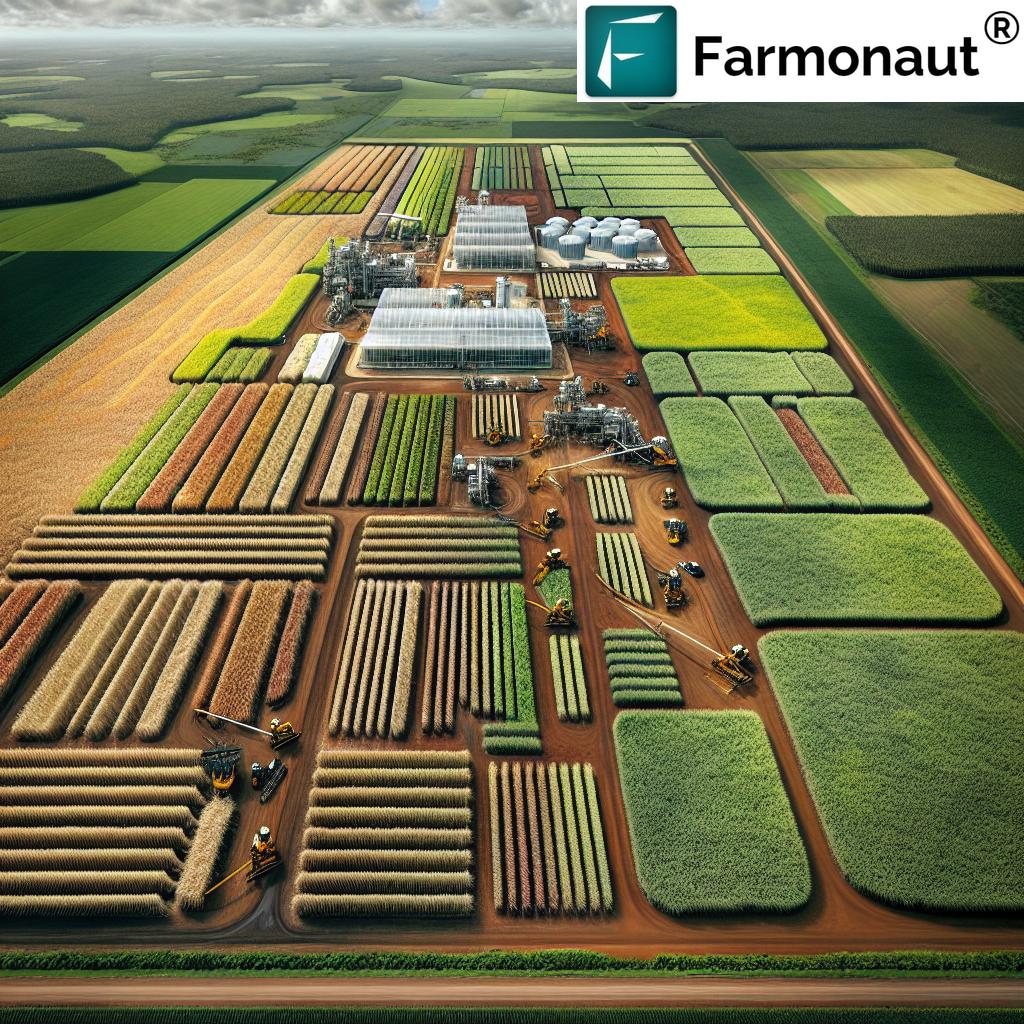
Comparative Analysis: Traditional vs. Farmonaut-Enhanced Sugarcane Farming
| Farming Aspect | Traditional Method | Farmonaut-Enhanced Method | Estimated Improvement (%) |
|---|---|---|---|
| Crop Monitoring | Manual field scouting | Satellite-based real-time monitoring | 70% time savings |
| Irrigation Management | Schedule-based | Precision irrigation based on soil moisture data | 30% water savings |
| Fertilizer Application | Uniform application | Targeted application based on crop needs | 25% reduction in fertilizer use |
| Pest and Disease Detection | Visual inspection | Early detection through satellite imagery | 40% reduction in crop losses |
| Yield Prediction | Historical data and estimation | AI-powered predictive analytics | 90% accuracy improvement |
| Sustainability Metrics | Limited tracking | Comprehensive monitoring of environmental impact | 50% improvement in sustainability reporting |
The Road Ahead: Challenges and Opportunities
While the future of sugarcane farming looks promising, there are still challenges to overcome and opportunities to seize:
Challenges:
- Technology Adoption: Encouraging widespread adoption of new technologies, especially among smaller farms, remains a challenge.
- Infrastructure: Reliable internet connectivity in rural areas is crucial for the full implementation of satellite-based technologies.
- Climate Change: Adapting to increasingly unpredictable weather patterns will require ongoing innovation and flexibility.
Opportunities:
- Market Expansion: The demand for sustainably produced sugar and sugarcane byproducts is growing, opening new markets for innovative farmers.
- Carbon Markets: As sustainable farming practices reduce carbon emissions, there’s potential for sugarcane farmers to participate in carbon credit markets.
- Knowledge Sharing: Improved data collection and analysis can foster better knowledge sharing across the industry, leading to collective improvements in farming practices.
Conclusion: A Sweeter Future for Sugarcane Farming
As we’ve explored throughout this article, the future of sugarcane farming in Latin America and beyond is being reshaped by innovative technologies and a commitment to sustainability. Farmonaut’s satellite-based solutions are at the forefront of this transformation, offering farmers the tools they need to increase yields, reduce environmental impact, and adapt to changing climatic conditions.
The journey towards fully sustainable and technologically advanced sugarcane production is ongoing, but the progress we’re seeing is undeniable. From chemical-free agriculture to precision resource management and the diversification of sugarcane products, the industry is evolving to meet the challenges of the 21st century.
As we look to the future, it’s clear that the integration of technologies like those offered by Farmonaut will play a crucial role in ensuring food security, promoting environmental stewardship, and supporting rural economies. The revolution in sugarcane farming is not just about producing more sugar; it’s about creating a more resilient, sustainable, and prosperous agricultural sector for generations to come.
Earn With Farmonaut: Affiliate Program
Earn 20% recurring commission with Farmonaut’s affiliate program by sharing your promo code and helping farmers save 10%. Onboard 10 Elite farmers monthly to earn a minimum of $148,000 annually—start now and grow your income!
Farmonaut Subscriptions
FAQ Section
Q: How does Farmonaut’s satellite-based crop monitoring work?
A: Farmonaut uses multispectral satellite imagery to analyze various aspects of crop health, including vegetation indices and soil moisture levels. This data is processed using advanced algorithms to provide farmers with actionable insights about their fields.
Q: Can Farmonaut’s technology be used for crops other than sugarcane?
A: Yes, Farmonaut’s technology is versatile and can be applied to a wide range of crops, including corn, soybeans, and many others. The principles of satellite-based monitoring and AI-driven analytics are applicable across different types of agriculture.
Q: How does Farmonaut contribute to sustainable farming practices?
A: Farmonaut promotes sustainability by enabling precise resource management, reducing the need for chemical inputs, and helping farmers adapt to climate change. The technology also supports practices that improve soil health and reduce the overall environmental impact of farming.
Q: Is Farmonaut’s technology affordable for small-scale farmers?
A: Farmonaut is committed to making its technology accessible to farmers of all scales. The company offers various subscription tiers and flexible pricing options to ensure that even small-scale farmers can benefit from advanced agricultural technologies.
Q: How can farmers get started with Farmonaut?
A: Farmers can get started by visiting Farmonaut’s website or downloading the mobile app. The platform offers a user-friendly interface that allows farmers to input their field boundaries and start receiving insights almost immediately.





